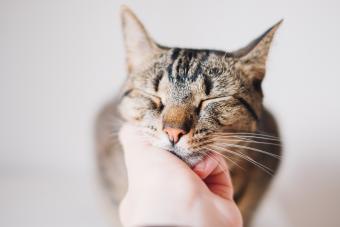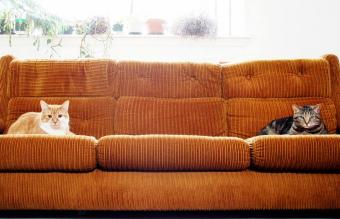
Cats don't drool nearly as much as their canine counterparts, so if you notice your cat drooling, you might be concerned. Why do cats drool, anyway? Drooling in cats can be a sign of nausea, dental disease, anxiety, or happiness. It's perfectly normal for your cat to drool while you pet them, but if you see them drooling at other times, it may indicate a problem. Discover why your cat is drooling and whether it means they need help.
Why Does My Cat Drool?
Cat drooling, known as ptyalism, isn't something most cat owners have to deal with the way dog owners do. So, if your cat suddenly starts drooling, what does it mean? Your cat might drool for one of these reasons:
- They're happy.
- Their mouth hurts.
- They're nauseous or ill.
- They're frightened.
- They tasted something unpleasant.
- They ingested a toxin.
1. Drooling While Being Petted
This might come as a surprise, but drooling in cats can be a sign of happiness, which may explain why your cat drools when you pet them. Pleasurable stimuli like petting and scratches can trigger hypersalivation. If a cat doesn't swallow the saliva quickly enough, it can leak out of their mouth as drool.
Not all cats drool when they're happy, so don't be worried if your cat doesn't do this. Other signs of contentment include purring, kneading, slow blinking, closed eyes, or head bunting.

2. Drooling Due to Oral Pain
If your cat has an uncomfortable mouth that's causing them pain, there's a good chance they'll drool because of it. Dental disease, stomatitis, oral ulcers, foreign objects stuck in the mouth, and even oral tumors can make your cat's mouth incredibly painful.
In addition to drooling, you might notice your cat pawing at their face, dropping food out of their mouth, oral swelling, or really putrid breath. You can try to peer into your cat's mouth to see if you notice anything abnormal, but your vet will likely have to do a thorough exam while your cat is sedated or anesthetized.
3. Nausea-triggered Drooling
Feeling sick to your stomach can trigger the production of extra saliva, which is why cats often drool when they're nauseous. This might be due to motion sickness if you've just gone for a car ride, or it could be caused by a medical condition.
Conditions including food allergies, kidney disease, or worms can all trigger vomiting. Other signs of nausea include lip-licking, gagging, lack of appetite, hunched posture, and painful belly. Remember, nausea isn't always accompanied by vomiting.
4. Frightened Drooling
Cats can suddenly begin drooling as a result of fear or stress. Loud noises, unfamiliar people, or new objects in the home can easily frighten a cat. Other signs of fear include hiding, staying low to the ground, dilated pupils, ears pulled back, puffed-up tail, and hissing.
5. Drooling After Giving Medication
It's not uncommon for a cat to drool excessively immediately after you give them oral medication. Most medicines, even those compounded in a tuna or chicken flavor, tend to be bitter, and cats are incredibly sensitive to bitter tastes.
Unfortunately, you can't follow their medication with a spoonful of sugar, but you can chase it with water. Use a separate syringe with about ½ to 1 milliliter of fresh water to help cleanse your cat's palate after their medication, then wipe their face with a clean tissue to remove any drool.
6. Drooling from Poisoning
Toxic substances like plants, household cleaners, or medications can cause drooling in pets. This can be secondary to irritation in their mouth from the toxin or nausea. If you're worried your cat ingested something toxic, head to your veterinarian right away or contact the Pet Poison Helpline for guidance. Other symptoms of poisoning include vomiting, twitching, weakness, and labored breathing.
When to See Your Vet for Cat Drooling
Drooling isn't always a sign that something is wrong with your cat, but it certainly could be. Closely monitor when your cat drools so you can identify if there are any triggers for it. If you notice any of the following symptoms in addition to drooling, it's time to see your veterinarian.

- Excessive drooling or foam with drool
- Vomiting
- Low or no appetite
- Losing weight
- Foul breath
- Low energy
- Difficulty swallowing
- Unable to close mouth
- Tremors
- Suspected ingestion of something toxic
Drooling in Cats Can Be Normal
A small amount of drool, particularly while you're petting your cat, isn't anything to panic about. In fact, it could simply be a sign they're incredibly relaxed and loving the attention. But if you notice your cat drooling at other times or drooling exorbitant amounts, it's important to rule out other causes with the help of your veterinarian.







